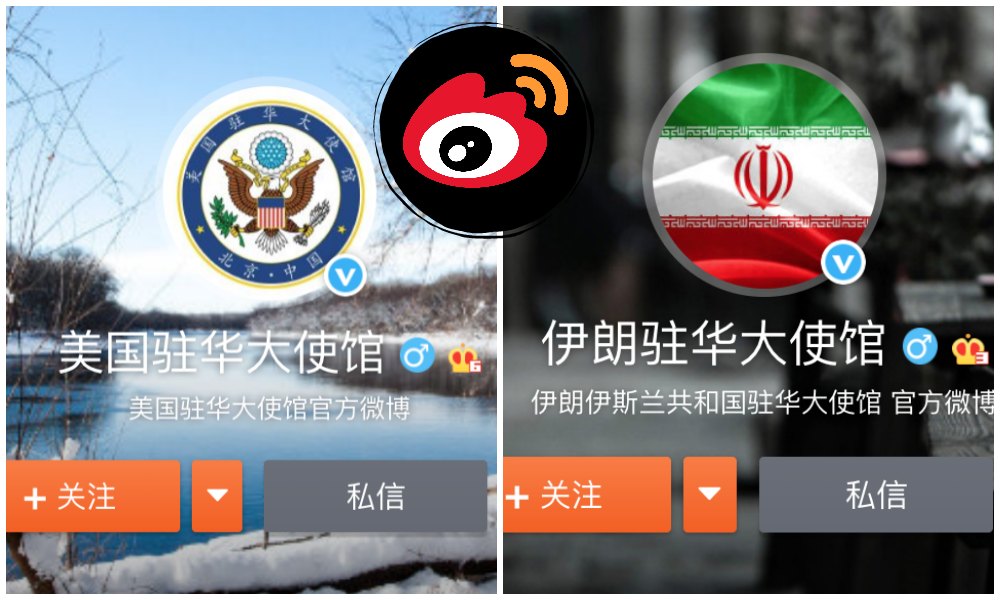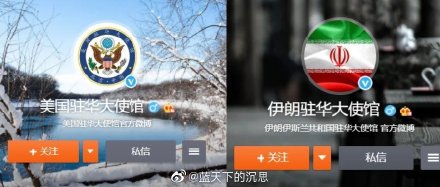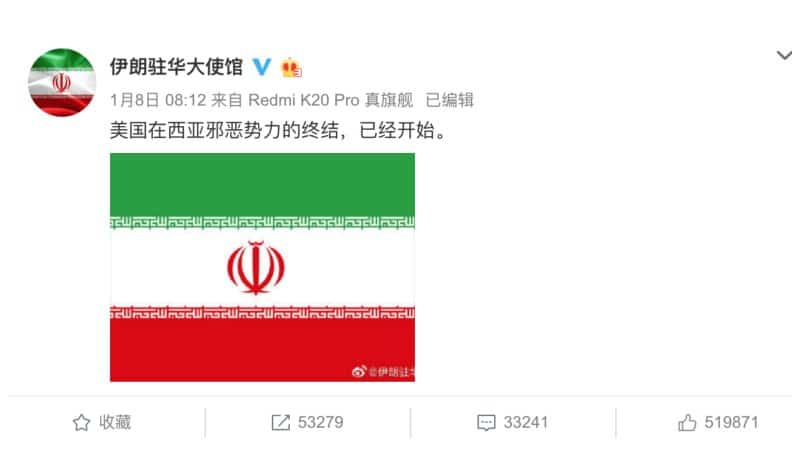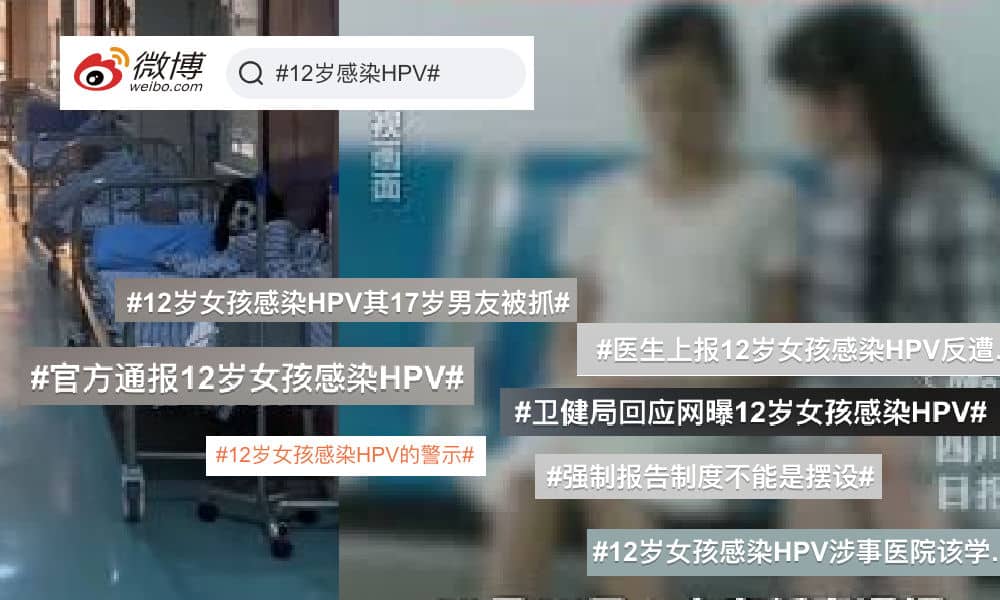China Media
The Weibo Battlefield in the US-Iran Conflict: Iranian and American Embassies ‘Argue’ on Chinese Social Media
The US-Iran conflict has extended to Weibo, where Chinese netizens watch the online ‘battle’ unfold.
Published
5 years agoon

“Don’t know if you all have discovered it yet, but the Iranian Embassy in China and the American Embassy in China have started to fight on Weibo,” prominent Chinese media outlet 21st Century Business Herald (21世纪经济报道) writes on Weibo on January 10th.
The Iranian and American embassies have been all the talk on Chinese social media this week. While US-Iran tensions are dominating international media headlines, the embassies of Iran and US have been taking their conflict to the Chinese social media platform.
Ever since January 3rd, when the head of Iran’s Quds Force Qasem Soleimani was killed by a US airstrike in Iraq, the Beijing embassies of both the USA and Iran have engaged in an online argument over the conflict between their two countries.

The Iranian Embassy (@伊朗驻华大使馆), that has 254670 followers on its Weibo account, condemned the assassination of Soleimani on January 3rd by reposting and translating a Twitter post by Iranian Foreign Minister Javad Zarif, calling it a “dangerous and foolish” act of “international terrorism.”
That post received over 23,000 likes and thousands of comments, with many of them showing support for Iran.
The US Embassy Weibo account (@美国驻华大使馆), that has over 2,5 million followers, also posted a response to the attack on January 4 by translating several quotes by US Secretary of State Mike Pompeo asserting that the decision to kill Soleimani was the right one and that it made the world a safer place.
Although many of the thousands of netizens responding to the American Embassy’s post praised the attack, there was also a lot of criticism.
“The terrorist group ‘USA’ has claimed responsibility for this act of terrorism,” one popular comment said, with others also pointing the finger at the American government for behaving as ‘terrorists.’
With the deepening of the US-Iran crisis after the Iranian military launched missiles against US bases in Iraq earlier this week, the Weibo posts and comments just keep coming in.
On January 8, the Iranian Embassy wrote that the “end of malign US presence in West Asia has begun,” a sentence also posted on Twitter by Foreign Minister Javad Zarif.

In between some light-footed Weibo posts about the Golden Globes, the American Embassy published various Weibo posts explaining its stance on the situation. One post of January 7 detailed the “bloody history” of Qassem Soleimani, writing about him as a terrorist and evil man who killed hundreds of people.

The online ‘battle’ between Iran and the US has led to various hashtags, such as “The Weibo Fight of the Iranian and US Embassy of China” (#美伊驻华大使馆微博互斗#), a topic that is receiving a lot of attention on Chinese social media.
The official accounts of two foreign powers’ embassies, discussing their conflict on a Chinese social media platform, in Chinese; it’s not common, and Chinese netizens talk about it while Chinese media write about it.
One sentence* has been reposted dozens of times by Weibo users over the past days: “Here’s the world’s largest imperialist country and the world’s largest theocratic republic, on a social media platform of the world’s largest socialist nation, using Standard Chinese to engage in a fierce diplomatic fight.”
“And we’re all watching and eating popcorn,” one commenter added [literal expression used is “Chī guā qúnzhòng” (吃瓜群众), online expression for “watermelon eating masses,” meaning clueless bystanders watching the situation unfold].
The Weibo battleground has seemingly also turned into a way for the embassies to win the favor of the Chinese public; the Iranian Embassy, for example, published a post on its Weibo account that invites Chinese tourists to visit Iran during the Spring Festival and pinned it to its main page to attract the attention of readers amidst the recent online upheaval.
The online presence of the US-Iran conflict shows the importance of ‘Weibo diplomacy,’ also known as ‘Weiplomacy.’ A large number of foreign embassies in China have a presence on Sina Weibo to engage with local audiences. It is a low-cost, convenient, and seemingly effective tool to promote their countries, political goals, and inform people about their latest activities.
Over the past week, it seems that the majority of Chinese netizens have sided with Iran and condemned the US. This public sentiment, however, might have more to do with the prevailing anti-American sentiments over the past year than a general pro-Iranian stance.
In a 2016 overview of most popular foreign embassies on Weibo, the US embassy scored a number three position with its 1+ million followers, while the Iranian account only came in at number 39 with a mere 6000+ fans on its account.
Although it is unusual for foreign embassies to use Weibo as an online battleground for their offline conflicts, it is not the first time it has happened. In 2014, What’s on Weibo reported how the Beijing embassies of Russia and Poland also argued on Weibo during the aftermath of MH17 crash.
This time around, some netizens conclude that the only one to really ‘win’ in online conflicts such as these is the Weibo platform itself. As the Weibo posts keep going, the ‘melon eating masses’ keep coming. “The Sina Weibo company must be secretly laughing at this ordeal,” one person writes.
By Manya Koetse, with contributions from Miranda Barnes
Follow @whatsonweibo
* Chinese sentence: “世界上最大的帝国主义国家,跟世界上最大的政教合一的神权共和国,在世界上最大的社会主义国家的网络平台上,使用标准的汉语进行激烈的外交缠斗”
Spotted a mistake or want to add something? Please let us know in comments below or email us. First-time commenters, please be patient – we will have to manually approve your comment before it appears.
©2020 Whatsonweibo. All rights reserved. Do not reproduce our content without permission – you can contact us at info@whatsonweibo.com.
Manya is the founder and editor-in-chief of What's on Weibo, offering independent analysis of social trends, online media, and digital culture in China for over a decade. Subscribe to gain access to content, including the Weibo Watch newsletter, which provides deeper insights into the China trends that matter. More about Manya at manyakoetse.com or follow on X.

China Media
12-Year-Old Girl from Shandong Gets Infected with HPV: Viral Case Exposes Failures in Protecting Minors
A doctor in Tai’an faced resistance when she tried to report a 12-year-old girl’s HPV case. She then turned to social media instead.
Published
2 days agoon
December 18, 2024
A 12-year-old girl from Shandong was diagnosed with HPV at a local hospital. When a doctor attempted to report the case, she faced resistance. Weibo users are now criticizing how the incident was handled.
Over the past week, there has been significant uproar on Chinese social media regarding how authorities, official channels, and state media in China have handled cases of sexual abuse and rape involving female victims and male perpetrators, often portraying the perpetrators in a way that appears to diminish their culpability.
One earlier case, which we covered here, involved a mentally ill female MA graduate from Shanxi who had been missing for over 13 years. She was eventually found living in the home of a man who had been sexually exploiting her, resulting in at least two children. The initial police report described the situation as the woman being “taken in” or “sheltered” by the man, a phrasing that outraged many netizens for seemingly portraying the man as benevolent, despite his actions potentially constituting rape.
Adding to the outrage, it was later revealed that local authorities and villagers had been aware of the situation for years but failed to intervene or help the woman escape her circumstances.
Currently, another case trending online involves a 12-year-old girl from Tai’an, Shandong, who was admitted to the hospital in Xintai on December 12 after testing positive for HPV.
HPV stands for Human Papillomavirus, a common sexually transmitted infection that can infect both men and women. Over 80% of women experience HPV infection at least once in their lifetime. While most HPV infections clear naturally within two years, some high-risk HPV types can cause serious illness including cancer.
“How can you be sure she was sexually assaulted?”
The 12-year-old girl in question had initially sought treatment for pelvic inflammatory disease, but upon review, her doctor discovered that she had been previously treated for vaginitis six months earlier. During further discussions with the girl, the doctor learned she had been sexually active with a boy five years her senior and was no longer attending school.
Given that the age of consent in China is 14 years old, the doctor sought to report the case to authorities. However, this effort was reportedly met with resistance from the hospital’s medical department, where she was allegedly questioned: “How can you be sure she was sexually assaulted?”
When attempts to escalate the case to the women’s federation and health commission went unanswered, the doctor turned to a blogger she knew (@反射弧超长星人影九) for help in raising awareness.
The blogger shared the story on Weibo but failed to receive a response through private messages from the Tai’an Police. They then contacted a police-affiliated Weibo channel they were familiar with, which eventually succeeded in alerting the Shandong police, prompting the formation of an investigation team.
As a result, on December 16, the 17-year-old boy was arrested and is now facing legal criminal measures.
According to Morning News (@新闻晨报), the boy in question is the 17-year-old Li (李某某), who had been in contact with the girl through the internet since May of 2024 after which they reportedly “developed a romantic relationship” and had “sexual relations.”
Meanwhile, fearing for her job, the doctor reportedly convinced the blogger to delete or privatize the posts. The blogger was also contacted by the hospital, which had somehow obtained the blogger’s phone number, asking for the post to be taken down. Despite this, the case had already gone viral.
The blogger, meanwhile, expressed frustration after the case gained widespread media traction, accusing others of sharing it simply to generate traffic. They argued that once the police had intervened, their goal had been achieved.
But the case goes beyond this specific story alone, and sparked broader criticisms on Chinese social media. Netizens have pointed out systemic failures that did not protect the girl, including the child’s parents, her school, and the hospital’s medical department, all of whom appeared to have ignored or silenced the issue. As WeChat blogging account Xinwenge wrote: “They all tacitly colluded.”
Xinwenge also referenced another case from 2020 involving a minor in Dongguang, Liaoning, who was raped and subsequently underwent an abortion. After the girl’s mother reported the incident to the police, the procuratorate discovered that a hospital outpatient department had performed the abortion but failed to report it as required by law. The procuratorate notified the health bureau, which fined the hospital 20,000 yuan ($2745) and revoked the department’s license.
Didn’t the hospital in Tai’an also violate mandatory reporting requirements? Additionally, why did the school allow a 12-year-old girl to drop out of the compulsory education programme?
“This is not a “boyfriend” or a “romantic relationship.””
The media reporting surrounding this case also triggered anger, as it failed to accurately phrase the incident as involving a raped minor, instead describing it as a girl having ‘sexual relations’ with a much older ‘boyfriend.’
Under Chinese law, engaging in sexual activity with someone under 14, regardless of their perceived willingness, is considered statutory rape. A 12-year-old is legally unable to give consent to sexual activity.
“The [Weibo] hashtag should not be “12-Year-Old Infected with HPV, 17-Year-Old Boyfriend Arrested” (#12岁女孩感染HPV其17岁男友被抓#); it should instead be “17-Year-Old Boy Sexually Assaulted 12-Year-Old, Causing Her to Become Infected” (#17岁男孩性侵12岁女孩致其感染#).”
Another blogger wrote: “First, we had the MA graduate from Shanxi who was forced into marriage and having kids, and it was called “being sheltered.” Now, we have a little girl from Shandong being raped and contracting HPV, and it was called “having a boyfriend.” A twelve-year-old is just a child, a sixth-grader in elementary school, who had been sexually active for over six months. This is not a “boyfriend” or a “romantic relationship.” The proper way to say it is that a 17-year-old male lured and raped a 12-year-old girl, infecting her with HPV.”
By now, the case has garnered widespread attention. The hashtag “12-Year-Old Infected with HPV, 17-Year-Old Boyfriend Arrested” (#12岁女孩感染HPV其17岁男友被抓#) has been viewed over 160 million times on Weibo, while the hashtag “Official Notification on 12-Year-Old Infected with HPV” (#官方通报12岁女孩感染hpv#) has received over 90 million clicks.
Besides the outrage over the individuals and institutions that tried to suppress the story, this incident has also sparked a broader discussion about the lack of adequate and timely sexual education for minors in Chinese schools. Liu Wenli (刘文利), an expert in children’s sexual education, argued on Weibo that both parents and schools play critical roles in teaching children about sex, their bodies, personal boundaries, and the risks of engaging with strangers online.
“Protecting children goes beyond shielding them from HPV infection,” Liu writes. “It means safeguarding them from all forms of harm. Sexual education is an essential part of this process, ensuring every child’s healthy and safe development.”
Many netizens discussing this case have expressed hope that the female doctor who brought the issue to light will not face repercussions or lose her job. They have praised her for exposing the incident and pursuing justice for the girl, alongside the efforts of those on Weibo who helped amplify the story.
The blogger who played a key role in exposing the story recently wrote: “I sure hope the authorities will give an award to the female doctor for reported this case in accordance with the law.” For some, the doctor is nothing short of a hero: “This doctor truly is my role model.”
By Manya Koetse, with contributions by Miranda Barnes
(follow on X, LinkedIn, or Instagram)
Spotted a mistake or want to add something? Please let us know in comments below or email us. First-time commenters, please be patient – we will have to manually approve your comment before it appears.
©2024 Whatsonweibo. All rights reserved. Do not reproduce our content without permission – you can contact us at info@whatsonweibo.com.
China Media
Hu Xijin’s Comeback to Weibo
After 90 days of silence, Hu Xijin is back on Weibo—but not everyone’s thrilled.
Published
1 month agoon
November 7, 2024
A SHORTER VERSION OF THIS ARTICLE WAS PART OF THE MOST RECENT WEIBO WATCH NEWSLETTER.
For nearly 100 days, since July 27, the well-known social and political commentator Hu Xijin (胡锡进) remained silent on Chinese social media. This was highly unusual for the columnist and former Global Times editor-in-chief, who typically posts multiple Weibo updates daily, along with regular updates on his X account and video commentaries. His Weibo account boasts over 24.8 million followers.
Various foreign media outlets speculated that his silence might be related to comments he previously made about the Third Plenum and Chinese economics, especially regarding China’s shift to treating public and private enterprises equally. But without any official statement, Chinese netizens were left to speculate about his whereabouts.
Most assumed he had, in some way, taken a “wrong” stance in his commentary on the economy and stock market, or perhaps on politically sensitive topics like the Suzhou stabbing of a Japanese student, which might have led to his being sidelined for a while. He certainly wouldn’t be the first prominent influencer or celebrity to disappear from social media and public view—when Alibaba’s Jack Ma seemed to have fallen out of favor with authorities, he went missing, sparking public concern.
After 90 days of absence, the most-searched phrases on Weibo tied to Hu Xijin’s name included:
胡锡进解封 “Hu Xijin ban lifted”
胡锡进微博解禁 “Hu Xijin’s Weibo account unblocked”
胡锡进禁言 “Hu Xijin silenced”
胡锡进跳楼 “Hu Xijin jumped off a building”

On October 31, Hu suddenly reappeared on Weibo with a post praising the newly opened Chaobai River Bridge, which connects Beijing to Dachang in Hebei—where Hu owns a home—significantly reducing travel time and making the more affordable Dachang area attractive to people from Beijing. The post received over 9,000 comments and 25,000 likes, with many welcoming back the old journalist. “You’re back!” and “Old Hu, I didn’t see you on Weibo for so long. Although I regularly curse your posts, I missed you,” were among the replies.
When Hu wrote about Trump’s win, the top comment read: “Old Trump is back, just like you!”
Not everyone, however, is thrilled to see Hu’s return. Blogger Bad Potato (@一个坏土豆) criticized Hu, claiming that with his frequent posts and shifting views, he likes to jump on trends and gauge public opinion—but is actually not very skilled at it, allegedly contributing to a toxic online environment.
Other bloggers have also taken issue with Hu’s tendency to contradict himself or backtrack on stances he takes in his posts.
Some have noted that while Hu has returned, his posts seem to lack “soul.” For instance, his recent two posts about Trump’s win were just one sentence each. Perhaps, now that his return is fresh, Hu is carefully treading the line on what to comment on—or not.
Nevertheless, a post he made on November 3rd sparked plenty of discussion. In it, Hu addressed the story of math ‘genius’ Jiang Ping (姜萍), the 17-year-old vocational school student who made it to the top 12 of the Alibaba Global Mathematics Competition earlier this year. As covered in our recent newsletter, the final results revealed that both Jiang and her teacher were disqualified for violating rules about collaborating with others.
In his post, Hu criticized the “Jiang Ping fever” (姜萍热) that had flooded social media following her initial qualification, as well as Jiang’s teacher Wang Runqiu (王润秋), who allegedly misled the underage Jiang into breaking the rules.
The post was somewhat controversial because Hu himself had previously stated that those who doubted Jiang’s sudden rise as a math talent and presumed her guilty of cheating were coming from a place of “darkness.” That post, from June 23 of this year, has since been deleted.
Despite the criticism, some appreciate Hu’s consistency in being inconsistent: “Hu Xijin remains the same Hu Xijin, always shifting with the tide.”

Hu has not directly addressed his absence from Weibo. Instead, he shared a photo of himself from 1978, when he joined the military. In that post, he reflected on his journey of growth, learning, and commitment to the country. Judging by his renewed frequency of posting, it seems he’s also recommitted to Weibo.
By Manya Koetse
(follow on X, LinkedIn, or Instagram)
Spotted a mistake or want to add something? Please let us know in comments below or email us. First-time commenters, please be patient – we will have to manually approve your comment before it appears.
©2024 Whatsonweibo. All rights reserved. Do not reproduce our content without permission – you can contact us at info@whatsonweibo.com.
Subscribe

12-Year-Old Girl from Shandong Gets Infected with HPV: Viral Case Exposes Failures in Protecting Minors

Explaining the Bu Xiaohua Case: How One Woman’s Disappearance Captured Nationwide Attention in China

Story of Chinese Female MA Graduate Going Missing for 13 Years Sparks Online Storm

Weibo Watch: China’s Online Feminism Is Everywhere

Why Chinese Hit Movie “Her Story” is ‘Good Stuff’: Stirring Controversy and Celebrating Female Perspectives

Death of Chinese Female Motorcycle Influencer ‘Shigao ProMax’ Sparks Debate on Risky Rides for Online Attention

Hidden Hotel Cameras in Shijiazhuang: Controversy and Growing Distrust

Weibo Watch: Small Earthquakes in Wuhan

The Price of Writing Smut: Inside China’s Crackdown on Erotic Fiction

Why the “人人人人景点人人人人” Hashtag is Trending Again on Chinese Social Media

The Hashtagification of Chinese Propaganda

Controversial Wanghong Livestreamers Are Becoming a Weibo Staple in China

Weibo Watch: “Comrade Trump Returns to the Palace”

The ‘Cycling to Kaifeng’ Trend: How It Started, How It’s Going

Hu Xijin’s Comeback to Weibo
Get in touch
Would you like to become a contributor, or do you have any tips or suggestions? Get in touch here!
Popular Reads
-

 China Insight7 months ago
China Insight7 months agoThe Tragic Story of “Fat Cat”: How a Chinese Gamer’s Suicide Went Viral
-

 China Music9 months ago
China Music9 months agoThe Chinese Viral TikTok Song Explained (No, It’s Not About Samsung)
-

 China Insight10 months ago
China Insight10 months agoThe ‘Two Sessions’ Suggestions: Six Proposals Raising Online Discussions
-

 China Digital7 months ago
China Digital7 months agoChina’s 2024 Gaokao Triggers Online Discussions on AI





Jialiang Zhang
February 2, 2020 at 3:35 am
Is there a comment section on this website? Or I am the first one leaving a comment on this post? I am really curious about what other people think about this.